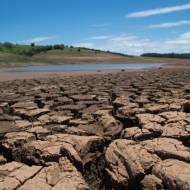Your cart is currently empty!

Mediterranean Experiencing Worst Drought in 900 Years, NASA Says


A NASA graphic indicating conditions in January 2012. Brown shades show the decrease in water storage from the 2002-2015 average in the Mediterranean region. (NASA/Goddard Scientific Visualization Studio)
The Mediterranean is experiencing its worst drought in centuries, but Israel has weathered this otherwise devastating lack of rain due to its advanced water technologies.
A newly published National Aeronautics and Space Administration (NASA) study has concluded that a drought from 1998-2012 in the eastern Mediterranean was the region’s worst drought during the past 900 years.
The drought’s history in Cyprus, Israel, Jordan, Lebanon, Syria, and Turkey was reconstructed by studying tree rings in order to understand the region’s climate and determine what shifts water to or from the area. Dry years are indicated by thin tree rings, and relatively wet years are indicated by thick rings, according to NASA.
The research seeks to improve computer models that simulate climate in the present and the future. NASA’s team also discovered patterns in the geographic distribution of droughts that provide a “fingerprint” for identifying droughts induced by human-driven climate change.
“The magnitude and significance of human climate change requires us to really understand the full range of natural climate variability,” said Dr. Ben Cook, lead author and climate scientist at NASA’s Goddard Institute for Space Studies and the Lamont Doherty Earth Observatory at New York’s Columbia University.
“If we look at recent events and we start to see anomalies that are outside this range of natural variability, then we can say with some confidence that it looks like this particular event or this series of events had some kind of human caused climate change contribution,” he said.
Israel is less affected by the drought as it has become a regional water empire due to its advanced desalinization plants.
Its water technologies a highly sought around the world, and most recently by California, which has been battling a prolonged drought.
By: JNS.org

Subscribe to Our FREE Newsletter for More Great Stories Like This One
United with Israel publishes stories like this every day. We believe that our work allows a more balanced view of Israel to emerge. With so much anti-Israel media bias out there from outlets like CNN and the BBC, helping the Holy Land means getting our message out to as many people as possible.
You can help.
Subscribe to our free newsletter to ensure that you get the latest and best stories from United with Israel. Together we can make a difference, and it starts with communication.
Source: United with Israel
